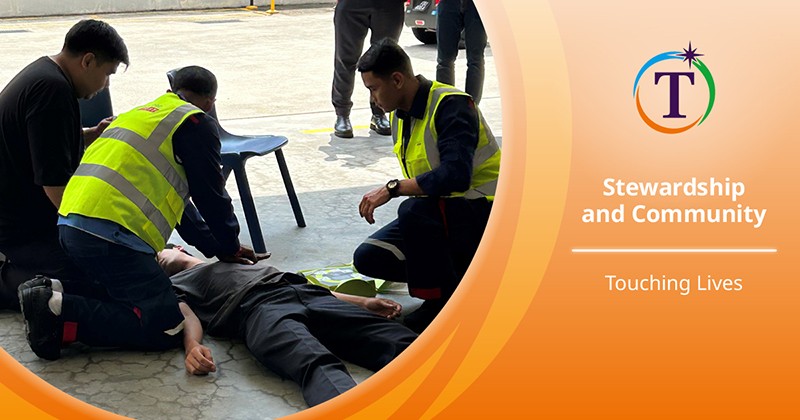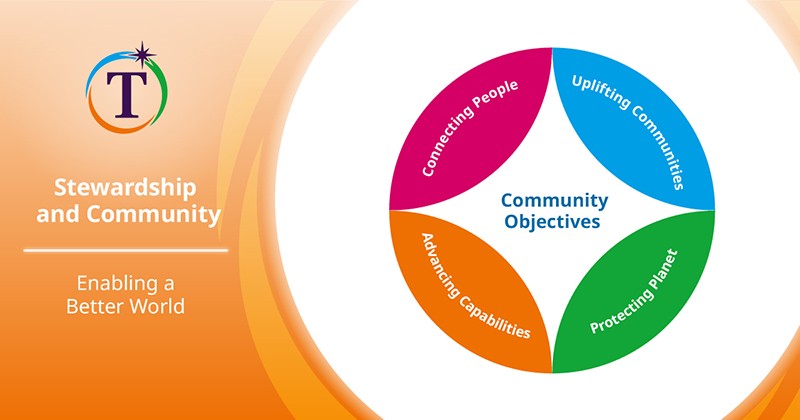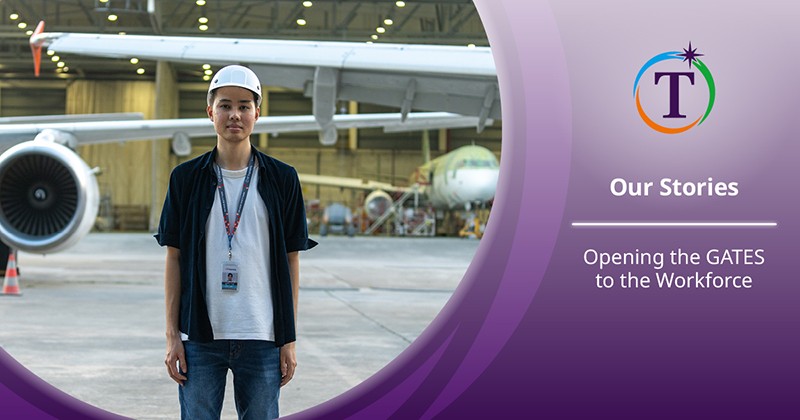Making a Difference
We supported two Pay For Success (PFS) programmes that ensure funding achieves sustainable outcomes for those in need.
Jump to

See Chun Shan (right) learning from his colleague Bob Ho, who mentors him in his job as an electrical engineer at ST Engineering
Empowering Talents with Autism
After graduating from the National University of Singapore in July 2022, See Chun Shan started viewing job postings. The 24-year-old, who has a Bachelor's degree in Electrical Engineering, found several openings in engineering companies that he could be a good fit for but did not apply for a single one.
“I was afraid of the job interview process. I kept worrying about not saying the correct things or even not being able to answer the questions,” he said.
Chun Shan was diagnosed at nine years old with autism — a developmental disorder that affects a person's ability to communicate and interact. He gets anxious in social interactions and even more so when he meets strangers.
Four months went by, and Chun Shan was still jobless. However, things took a positive turn when he learnt about the Growing Autistic Talent for Engineering Sector (GATES) programme at his university's career fair in November 2022. The programme trains and places tertiary-level graduates with full-time jobs in the engineering sector.
Through GATES, Chun Shan found a job in March 2023 as an electrical engineer at ST Engineering's Commercial Aerospace business.
The programme is supported by Temasek and others under a Pay for Success (PFS) model. Upfront funders, including Temasek, have collectively donated S$340,000. PFS is an innovative approach where private funders provide upfront capital and capacity building to fund social programmes. Other funders repay the upfront funders if the programmes achieve pre-determined outcomes — in GATES' case, upfront funders will be repaid if trainees stay in a job for nine months and other outcomes of job training and placement are achieved. This allows funds to be recycled for other worthwhile causes, empowering more beneficiaries and charities.
Developing Inclusive Workplaces
GATES was launched by Trampolene, a research and technology non-profit organisation. They recognised the challenges individuals with autism face in finding jobs, and identified engineering companies as potential employers, as the sector has been facing a shortage of workers with technical skills in recent years.
Since the GATES programme was launched in May 2022, 42 participants have been trained and 18 have secured jobs in fields such as aerospace engineering, precision engineering, and consumer product manufacturing.
“People with invisible special needs, such as autism, are often overlooked in the hiring process. We are trying to address this problem through GATES by enhancing their employment prospects. For the employer, they are able to tap on a valuable resource pool. For the individual, their lives will be transformed. For the community, we engender a more inclusive and kinder society.”
Shaun Seow
Head, Community Stewardship
Temasek
Learning through Mentorship
Upon joining the GATES programme, participants are assessed to identify suitable work environments and jobs based on their abilities. Job coaches are assigned to prepare participants for interviews and provide feedback on areas such as resume writing. These coaches continue to track their career development for up to a year, even after participants have secured a job.
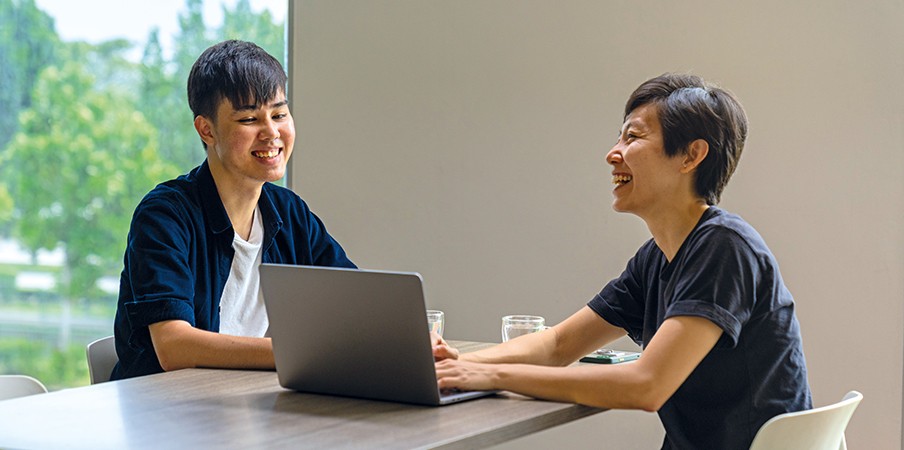
Chun Shan meets regularly with his GATES job coach Cheok Xue Ting to discuss how he is adapting at work
Chun Shan's coach Cheok Xue Ting, Chief Operating Officer of Trampolene, encouraged him to take up a part-time job to gain more work experience as he applied for jobs. She also guided him to make a video resume to showcase his technical skills and help potential employers to better understand him.
To manage his anxiety, she coached him on practical job skills such as making complex tasks manageable by breaking them down into smaller steps.
“With some support and guidance, people with autism can excel in high-skilled jobs. Ultimately, the goal is to empower and help these young adults to succeed.”
Cheok Xue Ting
Chief Operating Officer of Trampolene
Today, Chun Shan is adapting to his new workplace well, and learning from other colleagues about the work of converting passenger aircraft to freighters which are used for cargo transport.
“He learns quickly and is able to keep up with our fast pace of work,” said Tay Kim Seng, Chun Shan's supervisor and a principal engineer at ST Engineering.
Trampolene plans to expand the GATES programme, and train 70 young adults by the end of 2024.
Chun Shan says programmes like GATES can help to change society's mindset of people with autism. “I hope that through GATES, more people will understand that autism is a spectrum, and not a label that defines what we are capable of,” said Chun Shan.
Building Resilient Families
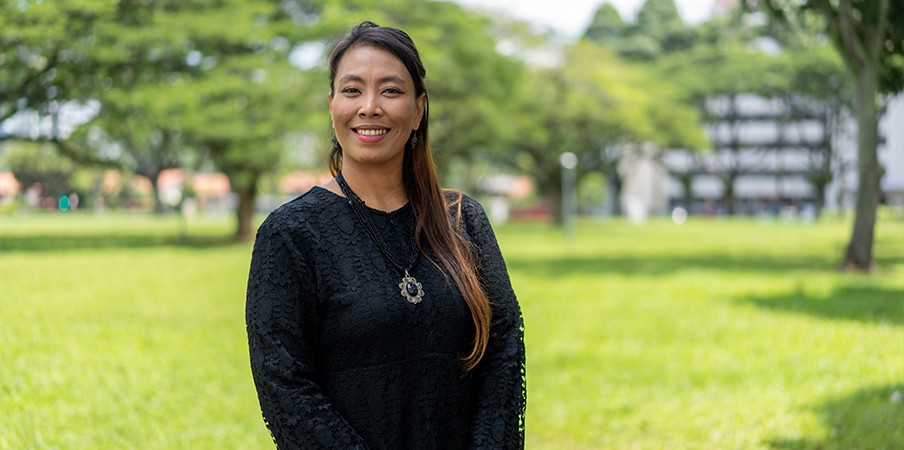
Family Empowerment Programme (FEP) beneficiary Irawati is empowered to plan for her family's future
For the last few years, Irawati, 37, has struggled to pay for the living expenses of her five children aged between 1 and 15 years old. She is unable to work as she has to take care of three of her children who are aged between 1 and 3 years old. Her husband does not earn a stable income as a parcel delivery driver.
“When I picked things up in the supermarket, I would immediately put them back because money was tight,” said Irawati.
Thankfully, her financial pressures have eased since May 2022, when her family started receiving monthly stipends of S$550 through the Family Empowerment Programme (FEP). The programme, run by social service agency AWWA, is a research study to assess if providing low income families with more income stability would help them shift their focus to longer term goals, in education, skills training, and employment. Currently, 75 households are participating in the programme and each receives a monthly average of S$500 in stipends.
The FEP, which was launched in 2022, is funded through a PFS model. Upfront donor Standard Chartered Singapore donated S$750,000 to support the first 18 months of the programme. If the pre-determined outcome targets are achieved, Temasek Trust will act as the outcomes funder and contribute further funding through its oscar@sg fund to refine and extend the FEP to positively impact more beneficiaries.
“We appreciate the rigour placed on outcomes in this project, and hope it will galvanise others — across private, philanthropic, and public sectors — to collaborate on solving complex issues, especially social issues which tend to be multi-dimensional and difficult to attribute impact. The data and insights on how such interventions have helped the families participating in FEP will provide a proof point for public and private institutional funders to consider taking on the role of outcomes funders, thereby creating a pathway for effective social innovation to be sustained at scale.”
Desmond Kuek
CEO, Temasek Trust
Lending a Helping Hand
The idea of FEP was developed by AWWA and Tri-Sector Associates, a social enterprise, at the beginning of the COVID-19 pandemic in 2020. AWWA works with low income individuals and saw that many were in urgent need of financial assistance as they had lost their jobs. The programme also aims to determine the effectiveness of providing monthly stipends to improve the long term financial stability of low income families. Beneficiaries participate in surveys conducted twice a year by their case workers who ask them questions about their finances, employment status, job stability, and the mental health of their families.
“As financial security is a pivotal lever of social mobility, we felt it was important to be innovative and explore the long term impact of the provision of cash stipends, which is a less common approach. It is encouraging to see how the lives of so many participants, like Irawati, have been impacted. I believe we will be able to glean many valuable insights from the programme as we work towards better outcomes.”
See Toh Huixia
AWWA’s Director of Family Services
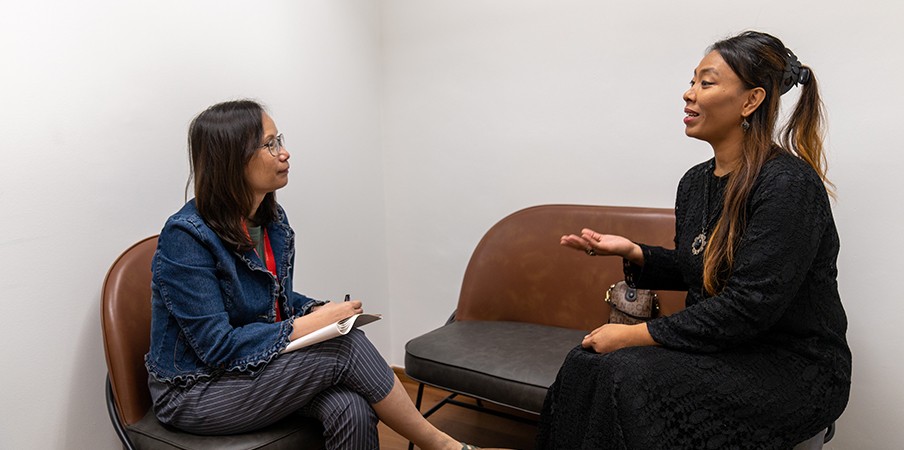
Irawati shares with her AWWA case worker Lau Chor Eng how the monthly stipends she receives benefit her family
Planning for a Brighter Future
Beneficiaries said the monthly stipends have improved their families’ overall well-being and helps them to set aside money to upgrade their skills.
Irawati uses the stipends to buy healthier food and textbooks for her children. She also uses the stipends to pay for the cost of getting a motorcycle licence. She aims to take up a job as a food delivery rider which allows her to work flexible hours and look after her children.
“I feel blessed and am thankful for the FEP. I hope that the programme will reach out to more people and brighten more lives,” said Irawati.
